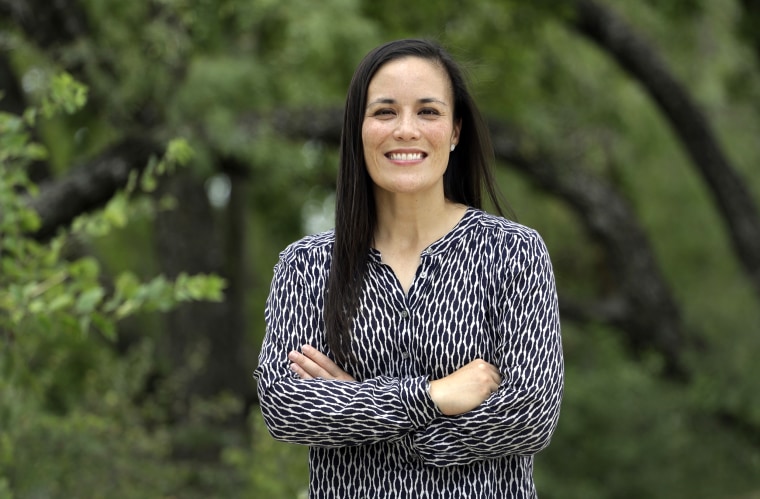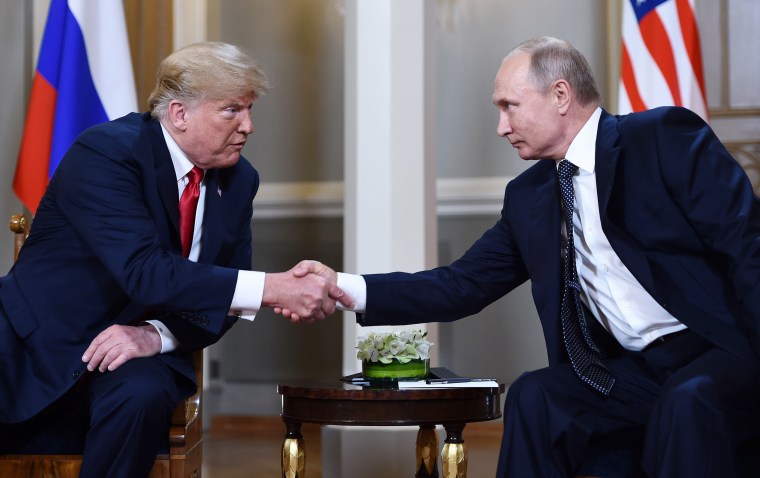They put their lives on the line in foreign war zones, conducted secret missions to collect valuable intelligence and made enormous sacrifices for their country — only to see their former colleagues disrespected by President Donald Trump.
Now, driven by the president's conduct, they're taking matters into their own hands and gearing up for a different challenge: running for Congress as Democrats.
Fed up with what they see as Trump's disdain and distrust of the intelligence community — and his refusal to embrace fully the conclusion that Russia interfered in the 2016 election — an unusually large number of former intelligence officers and operatives are campaigning for office as Democrats in this fall's midterm elections, according to experts.
For many — like Abigail Spanberger in Virginia's Richmond-area 7th Congressional District and Elissa Slotkin in Michigan's Lansing-area 8th Congressional District — it's a matter of restoring respect for the agencies they gave so much of themselves to.
All agree that their decision to run began with the current commander in chief.
"It's incredibly disappointing," Spanberger, who served as a CIA officer in the U.S. and abroad for eight years before moving back to Virginia in 2014, told NBC News. "To have a president who doesn't see your work as service to the nation, work that is meant to help him, it's hard to see."
Slotkin, who was a Middle East analyst for the CIA, did three tours in Iraq, and worked in the State and Defense Departments in the George W. Bush and Barack Obama administrations, said she's been dismayed that the sacrifice she and her former colleagues made would be disregarded.
"It's rattled me and everyone I know in the community," she told NBC News. "It's been a big surprise to me that the commander in chief would be targeting his own intelligence community. These are people who come in every day and make sacrifice and work to keep our country safe."
Gina Ortiz Jones, a former Air Force intelligence officer and Defense Intelligence Agency employee who is running in Texas's 23rd Congressional District in the southwestern portion of the state, described the effect that Trump's insults of the intelligence community had on her.
"Frankly, there's nothing more motivating," she said.
Others ran — but lost — in Democratic primaries earlier this year, including Jeff Beals, a former CIA officer, and Patrick Ryan, a former Army intelligence officer, who both competed in New York's 19th Congressional District primary.
Republican former intel officers are running, too. Andrew Grant, a former intelligence officer in the Marines, is challenging incumbent Democratic Rep. Ami Bera in California's Sacramento-area 7th Congressional District, and the incumbent who Ortiz Jones is opposing in Texas, Will Hurd, is a former CIA operative himself.
But Congress-watchers and national security experts have noticed the uptick in intel community members running as Democrats and attribute it to Trump.
"To be sure, President Trump is certainly not the first policy-maker to be dismissive or even the first to be suspicious about intelligence,” said Elizabeth Arsenault, a professor at the Center for Security Studies at Georgetown's Edmund A. Walsh School of Foreign Service. "But his depth of hostility toward public service in general and intelligence work in particular is unprecedented."
"The wave of former intelligence officials running as Democrats is new," added Arsenault.

Matthew Dallek, a professor at George Washington University's Graduate School of Political Management, said the unusually large number of candidates running caught his eye because "in the intelligence world anonymity is really prized."
"Intel officers aren't typically political," Dallek said. "The surge in them running as Democrats, it's pretty safe to say it's a reaction to Trump's concerted attacks" on the intelligence community.
Spanberger and Slotkin both said they valued the anonymity that came with working at the CIA, and had never wanted the public attention that comes with politics.
But for Spanberger (running against Republican Rep. Dave Brat) and Slotkin (taking on Republican Rep. Mike Bishop) — both races are rated as toss-ups by the Cook Political Report — a pivotal moment came on Trump's first full day into his presidency, when he delivered a bizarre, unscripted and self-referential speech before a wall of stars memorializing fallen officers at the CIA headquarters.
"That is the equivalent of hallowed ground, where people who died in service to this country are honored," Spanberger said. Just days earlier, the president had seemed to compare elements of the U.S. intelligence community to "Nazi Germany."

Those running also expressed concern about Trump's summit in July with Russian leader Vladimir Putin, where the president appeared to accept Moscow's claim that it did not orchestrate a campaign to influence the election.
Evan McMullin, a former CIA operative and former Republican who ran for president as an independent in 2016, knows the terrain well and isn't surprised to see more former intel people running this year.
"They've seen the destructive tactics of corrupt power-seeking demagogues overseas," he said, "and they correctly see the same threat in our president and the rise of polarizing extremist movements in the U.S."
CORRECTION (Sept. 9, 2018, 1:34 p.m. ET): An earlier version of this article misstated the name of the Republican incumbent in Michigan’s 8th Congressional District. He is Mike Bishop, not Greg Bishop.
